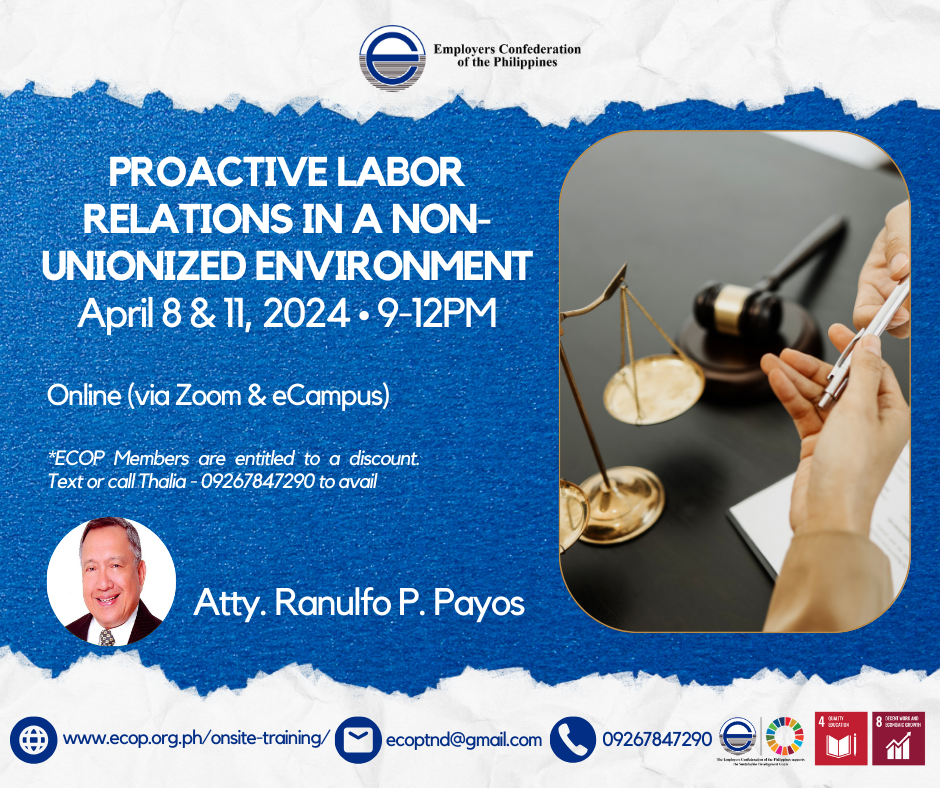Brief History of the Law
- On March 7, 2017, Senate Bill No. 1363 “An Act Institutionalizing Telecommuting in the Workplace and For Other Purposes” was filed and sponsored by Committee Chairman Joel Villanueva and Sen. Cynthia Villar.
- Thereafter, on March 14, 2018, House Bill No. 7402 also entitled “An Act Institutionalizing Telecommuting in the Workplace and For Other Purposes” was filed and sponsored by Committee Chairman Randolph Ting, Hon. Elray Villafuerte, Hon. Alfred Vargas, Hon. Monseur del Rosario, Honorable John “Yul Servo” Nieto, and Hon. Kuya John Sy-Alvarado
- After roughly ten (10) months therefrom, the bill was signed into law by President Duterte on December 20, 2018.
- Note that the sponsors from the 17th Congress are both Chairmen of the Committee of Labor of the House of Representatives and the Senate.
- Hence, it was approved within a short period of time.
Timeline in the Formulation of the Law
- Tripartite Executive Committee Meetings to draft and discuss the Implementing Rules and Regulations (IRR) of the law were held on March 5 and March 12.
- A National Tripartite Industrial Peace Council (NTIPC) Meeting was held on March 21, 2019 which approved and finalized the IRR.
- The IRR was signed by the Secretary of Labor and Employment on March 26, 2019.
- The IRR was published on April 24, 2019 by the Manila Times.
- Effectivity of the law: May 10, 2019.
Telecommuting is defined by law as a work arrangement wherein an employee is allowed to work from an alternative workplace with the use of telecommunication and computer technologies.
First and foremost, it is important to note that the adoption and implementation of the telecommuting work arrangement shall be practiced through the exercise of management prerogative or collective bargaining, based on the voluntariness and mutual consent of the employer and employee, taking into account the nature of work to be done. Hence, the telecommuting work arrangement is initiated and offered first by the employer to the employee. Without such offer, an employee cannot avail of a telecommuting work arrangement.
Next, it should be emphasized that since the term “telecommuting” refers to a work arrangement that allows an employee in the private sector to work from an alternative workplace with the use of “telecommunication and/or computer technologies”, an employee who does not use any means of telecommunication and/or computer technologies shall not be covered by the said law.
The law also mandates employers to ensure not only to abide by the minimum labor standards, but also to ensure that “telecommuting employees are given the same treatment as that of comparable employees working at the employer’s premises”, including overtime pay, night shift differential, rest periods regular holidays, special non-working holidays, same equivalent workload, same access to training, career development opportunities, and other benefits, among others.
Finally, the law mandates that the employer shall be responsible for taking the necessary measures to protect the data used and processed by the telecommuting employee.
To this end, the law shall protect the rights of workers and promote their welfare, especially in the light of technological development that has opened up new and alternative avenues for employees to carry out their work.
R.A. 11165 Telecommuting Law
[embeddoc url=”https://ecop.org.ph/wp-content/uploads/2019/05/20181220-RA-11165-RRD.pdf” download=”all”]
Department Order 202-19 Implementing Rules and Regulations of Republic Act No. 11165 otherwise known as the ”Telecommuting Act”
[embeddoc url=”https://ecop.org.ph/wp-content/uploads/2019/05/DO-202-19-Implementing-Rules-and-Reulations-of-Republic-Act-No.-11165-otherwise-known-as-the-Telecommuting-Act.pdf” download=”all”]








